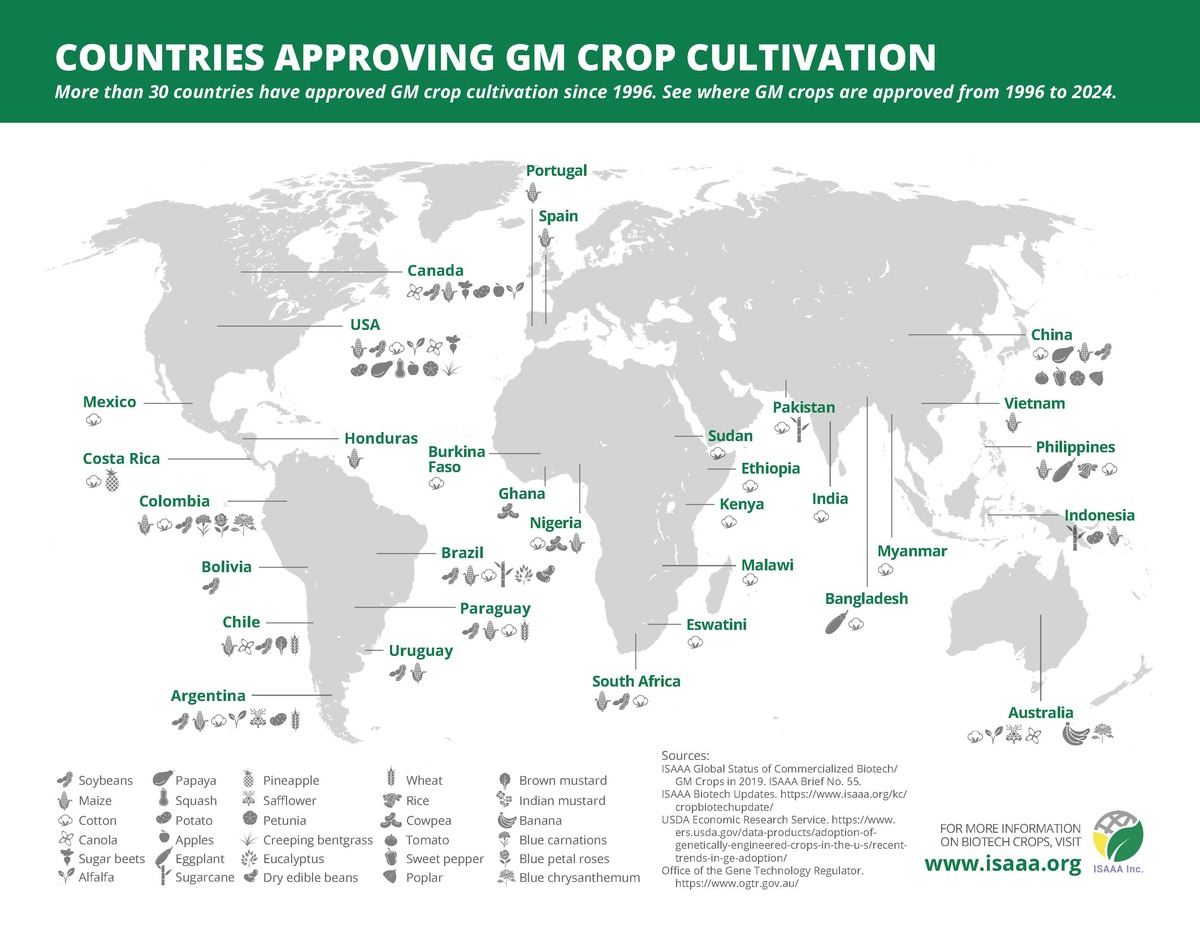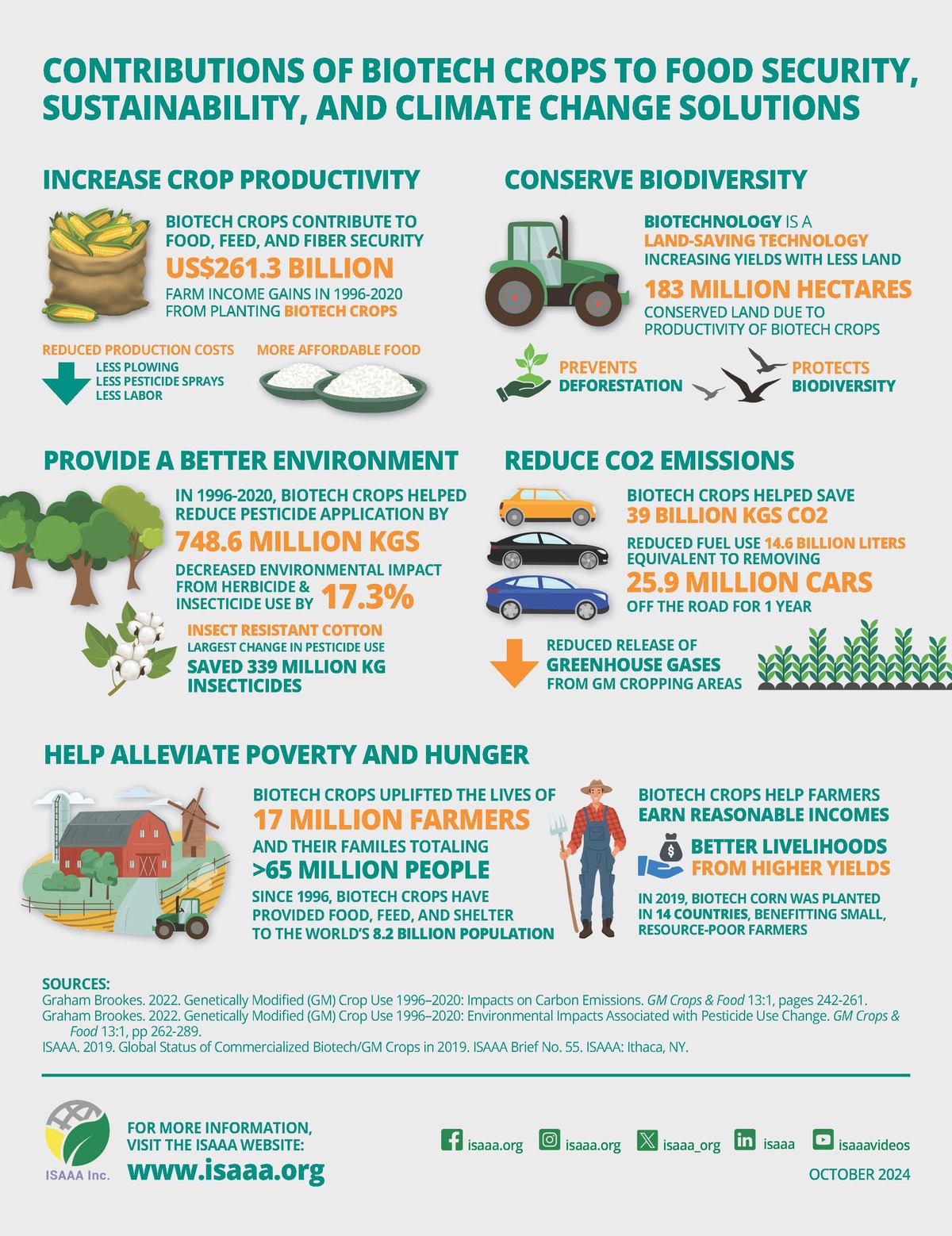Countries Approving GM Crop Cultivation
| |
Over 30 countries have granted cultivation approvals to genetically modified (GM) crops as of October 2024. This indicates a significant growth in utilizing biotechnology as a sustainable tool to address global challenges such as food security and climate change.
ISAAA releases two new infographics highlighting the Countries Approving GM Crop Cultivation and Contributions of Biotech Crops to Food Security, Sustainability, and Climate Change Solutions.
Additional GM Crop Adopting Countries from Africa
In 2019, a total of 29 countries planted GM crops globally. Five years later, the number of adopting countries increased to 32 to date, with three additional countries from Africa that granted cultivation approvals.

In 2020, Kenya announced the approval of Bt cotton after the five-year field trials exhibited effective resistance to African bollworm and increase in yield. Based on the results, the insect resistant cotton is projected to boost productivity from the current estimate of 572 kg/ha to 2,500 kg/ha and lower the cost of production by 40%. With this immense projected impact, the biotech crop is expected to increase the cotton production of Kenyan farmers and thus boost the manufacturing pillar of the Big 4 Agenda where it is stated that Kenya aims to be at the forefront of global textile and apparel production.
In the five-year period, Kenya also lifted the 10-year ban on the importation and cultivation of GM products (by Cabinet decision on October 3, 2022). While this decision has been challenged in court, Kenya has continued with research and advanced other crops including insect resistant (Bt) maize, virus resistant cassava and late blight resistant potato in the research and biosafety regulatory approval pipeline. Bt maize and VIRCA cassava could be granted commercial approval following the court case resolution.
Ghana is the latest addition to the biotech-adopting countries in 2024 with the commercial approval for GM cowpea with resistance to pod-borer developed by the Council for Scientific and Industrial Research-Savanna Agricultural Research Institute (CSIR-SARI).
Burkina Faso has come back to the list of GM crop-adopting countries this year with the approval for cultivation of Bt cotton hybrids from 2024 to 2033. The Bt cotton-producing country reported seven years of adoption from 2008 until 2015, the same years when the country was hailed as the top cotton producer in the region. The suspension in planting occurred in the 2016/2017 planting season due to concerns regarding the lint length of the varieties being cultivated at the time. The newly approved Bt cotton hybrids have been hailed to achieve the desired lint length, attaining the requirements, and achieving a competitive edge for the Burkina Faso market.
GM Crops in the Pipeline
Internationally recognized researchers and institutions are focusing their efforts on the development of GM products aimed at addressing global challenges in agriculture, nutrition, and sustainability. Here are some of the promising GM crops in the pipeline:
- The NEWEST Rice project has developed nitrogen-efficient, water-efficient, and salt-tolerant rice with 10-15% improvement in yield, a 30% reduction in nitrogen use, and a 15% decrease in total production costs. Multi-locational trials have been conducted by the National Cereals Research Institute in Nigeria.
- The National Roots Crops Research Institute in Umudike and the Donald Danforth Plant Science Centre have been developing two virus-resistant cassava varieties for East Africa, Nigeria, and other West African countries. The Nigerian VIRCA Plus product has elevated levels of iron and zinc for improved nutrition, biofortification, and disease resistance.
- An international consortium, including EU research institutions and the USDA Agricultural Research Service developed HoneySweet, a plum tree resistant to the plum pox virus. The field trials showed promising results, and the developers are hoping for the final approval for commercialization in the EU in the next few years.
- The University of the Philippines Los Baños developed a GM papaya resistant to the papaya ringspot virus. This GM crop projects total benefits of approximately US$70M over a 16-year window. The field trials in 2014 and 2017 have been completed, and the preparations for further trials are in the works.
- Researchers in Kenya are working on insect resistant and drought tolerant corn, Cassava Brown Streak Disease (CBSD) resistant cassava, enhanced vitamin A, zinc, and iron sorghum, and late blight resistant potato. These crops may be commercialized in the next five years.
- Indonesia has also started research on high sucrose sugarcane, Golden Rice, and Fe-Zn biofortification rice. Michigan State University (MSU) and National Research and Innovation Agency are also a step forward in conducting safety studies for both granola and diamant varieties of GM potatoes with stacked genes in 2023-2024.
- Delhi University's GM mustard is slowly progressing through India’s regulatory approval system. Other crops being improved in India using biotechnology are bananas, cabbage, cassava, cauliflower, chickpeas, cotton, eggplant, papayas, peanuts, pigeon peas, potatoes, rice, sorghum, sugarcane, tomatoes, watermelon, and wheat.
- Costa Rican researchers are working on drought resistant rice and GM pink pineapple with higher levels of lycopene. Although the pink pineapple is not yet approved for commercialization, researchers have ongoing permission to expand production from the Costa Rican National Technical Biosafety Commission.
- Several Colombian research institutions have been developing sugarcane varieties resistant to yellow leaf virus and cultivars with increased sugar, biomass and salt, aluminum, and water stress tolerance, and GM rice, cassava, cacao, castor bean, sacha inchi, potato, and coffee varieties.
- Chile’s National Institute of Agricultural Research is developing biotech grapes and tree nuts resistant to fungi and viruses, as well as potatoes, rice, and corn.
- Brazil also has several GM crops in the pipeline awaiting commercial approval including potatoes, papaya, rice, and citrus, which are at the early stages of development and approval.
- The Bangladesh Agricultural Research Institute and MSU are developing late blight resistant potatoes. Controlled field trials in four research stations commenced in 2023.
Latest GM Crops and Traits
TELA maize. Four transgenic maize varieties with insect (stem-borer and fall armyworm) resistance and drought tolerance traits were approved for cultivation in Nigeria on January 11, 2024. The development of the maize varieties is part of the TELA Maize Project, which is being implemented by the African Agricultural Technology Foundation (AATF) and partners in Ethiopia, Kenya, Mozambique, Nigeria, South Africa, Tanzania, and Uganda. The approved varieties exhibit a yield advantage of up to 10 tonnes per hectare under good agronomic practices. The national average for similar hybrids is 6 tonnes per hectare. Stem borers reduce maize production in several African countries, while fall armyworms can destroy up to 20 million metric tons of maize in Africa each year, enough to feed 100 million people.
Golden Rice. Known as Malusog Rice (healthy rice) in the Philippines, the vitamin A-enriched rice was approved for commercial propagation in the country in 2021. Researchers from the International Rice Research Institute (IRRI) and Philippine Rice Research Institute (PhilRice) engineered rice to provide up to 50 percent of the estimated average requirement for vitamin A in young children, the age group most vulnerable to vitamin A deficiency (VAD) in the country. Around one in five children from the poorest communities in the Philippines suffer from VAD, a condition affecting an estimated 190 million children worldwide. The condition is the most common cause of childhood blindness and a contributing factor to a weakened immune system.
TR4-resistant banana. GM Cavendish banana QCAV-4 resistant to the fungal disease Fusarium wilt tropical race 4 (TR4) or Panama disease has been licensed in Australia for commercial cultivation in 2024. It is the world’s first GM banana to be approved for planting and the first biotech fruit approved for cultivation in Australia.
Yield-enhanced eucalyptus. GM eucalyptus with volumetric wood increase, herbicide tolerance, insect resistance, and antibiotic resistance traits have been approved for cultivation in Brazil in 2024. Developed by FuturaGene Group, GM eucalyptus is the first of its kind to receive commercial use license in 2015 and was since improved to deliver optimized derivatives exhibiting accelerated growth and producing significantly more wood than conventional eucalyptus and potentially reducing the footprint of forests while generating massive economic and environmental benefits.
Glowing petunia. Designed by Light Bio for gardens and homes, Firefly Petunias glow brighter under sufficient sunlight and optimum growth conditions. The flowers that look white in the day are genetically engineered to glow green in the dark. Light Bio announced first shipping of 50,000 glowing petunias in April 2024.
GM Event Approvals
The ISAAA GM Approval Database (GMAD) is a one-stop shop that compiles biotech events approved for commercialization/planting and importation (food and feed) with a brief description, trait, developer, and year of approval for cultivation. GMAD is one of the top online resources for scientists, academics, regulators, media practitioners, and the general public to keep them updated with information about biotech event approvals.
As of August 2024, GMAD has a total of 614 approvals, with maize having the most approvals (290 events), followed by cotton with 72 events, and potato with 52 events. The majority of the events (405 events) have stacked trait events and 209 events have singular trait events. Approvals for food, feed, and cultivation are at their peak in 2022. From 1998 to 2023, Colombia had the highest number of food approvals, while the European Union and Argentina topped feed and cultivation approvals, respectively.
Contributions of Biotech Crops to Food Security, Sustainability, and Climate Change Solutions
According to PG Economics, biotech crops contributed to food security, sustainability, and climate change solutions by:
- Increasing crop productivity by $261.3 billion, equivalent to an average increase in income of $112/hectare;
- Conserving biodiversity by saving 183 million hectares of land due to the productivity of biotech crops;
- Providing a better environment by saving 748.6 million kg. a.i. of pesticides from being released into the environment;
- Reducing CO2 emissions by 39 billion kg, equivalent to taking 25.9 million cars off the road for one year; and
- Helping alleviate poverty by uplifting the economic situation of more than 17 million small farmers, and their families totaling >65 million people, who are some of the poorest people in the world.

Pitfalls and Possibilities
Legal challenges in countries such as the Philippines and Kenya have caused delays in the cultivation of GM crops as well as in bringing benefits to farmers and consumers. On the other hand, the GM crop market China anticipates high adoption in the coming years. A total of 81 new cultivation approvals have been granted in 2023 and 2024 for maize and soybeans, apart from the renewal of biosafety certificates for previously approved crops. Australia also contributes to the favorable adoption of GM crops in the Asia-Pacific region with the approval of new crops such as banana, Indian mustard, and chrysanthemum.
Latin American countries, particularly Brazil and Argentina, continue to model excellent adoption rates in the region, paralleled with regulatory cooperation.
The US, the top producer of GM crops globally, is also expected to maintain its position as a leader in GM crop adoption with continuous enhancements in its guidelines and targets. As of 2023, the USDA Economic Research Service reported that over 90% of the US maize, cotton (upland), and soybeans was genetically engineered varieties.
With the latest addition in biotech-adopting countries from Africa and intensive R&D initiatives focused on the region, more African countries are expected to join the list in the next few years.
For more details, download the ISAAA infographics on Countries Approving GM Crop Cultivation and Contributions of Biotech Crops to Food Security, Sustainability, and Climate Change Solutions.
Acknowledgements to Dr. Margaret Karembu and Dr. Paul Chege of ISAAA AfriCenter for updates in Africa.
| Newer Post | Archive | Older Post |
Science Speaks is ISAAA Inc.'s official blog. Weekly blog articles, authored by ISAAA writers, partners, and invited contributors, aim to help share, disseminate, and promote scientific knowledge and its vital role in achieving global agricultural sustainability and development. Your support to Science Speaks will help us achieve this goal. You can help us by donating as little as $10.

